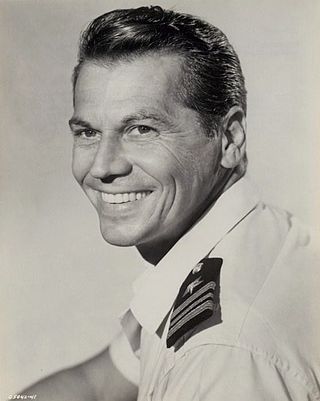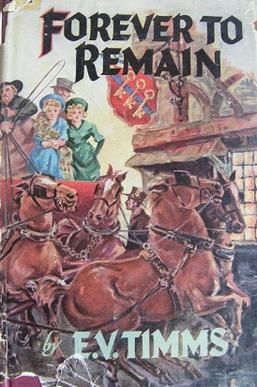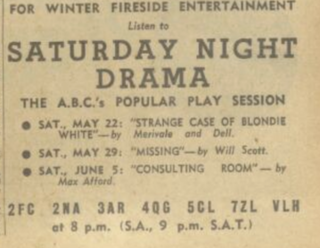Related Research Articles

Frederick George Peter Ingle Finch was an English-Australian actor of theatre, film and radio.

Ronald Egan Randell was an Australian actor. After beginning his acting career on the stage in 1937, he played Charles Kingsford Smith in the film Smithy (1946). He also had roles in Bulldog Drummond at Bay (1947), Kiss Me Kate (1953), I Am a Camera (1955), Most Dangerous Man Alive (1961) and King of Kings (1961).
Ronald Grant Taylor was an English-Australian actor best known as the abrasive General Henderson in the Gerry Anderson science fiction series UFO and for his lead role in Forty Thousand Horsemen (1940).

Eureka Stockade is a 1949 British film of the story surrounding Irish-Australian rebel and politician Peter Lalor and the gold miners' rebellion of 1854 at the Eureka Stockade in Ballarat, Victoria, in the Australian Western genre.

Bush Christmas is a 1947 Australian–British comedy film directed by Ralph Smart and starring Chips Rafferty. It was one of the first films from Children's Entertainment Films, later the Children's Film Foundation.
Rex Rienits was an Australian writer of radio, films, plays and TV. He was a journalist before becoming one of the leading radio writers in Australia. He moved to England in 1949 and worked for a number of years there. He later returned to Australia and worked on early local TV drama.
Anthony Scott Veitch was an Australian writer of radio, films, novels and TV. He worked for a number of years in British film and TV. His feature credits include The Kangaroo Kid (1950) and Coast of Skeletons (1964). He wrote more than 100 novels, including westerns and historical fiction.

Forever to Remain is a 1948 novel by E. V. Timms, the first in his Great South Land Saga series of novels. He wrote it intending to be the first in a 12-part series of novels. It is set in West Australia, where Timms had spent some of his childhood. Timms had written a numner of historical novels but this was his first with an Australian setting.

The Pathway to the Sun is a 1949 novel by Australian author E. V. Timms. It was the second in his Great South Land Saga of historical novels..
Nigel Tasman Lovell was an Australian stage, radio, film and television actor, and producer of opera and both stage and radio drama.

Musette Morell was an Australian playwright and children's writer. She wrote both for the stage and for radio.
The Crater is a 1948 Australian radio play by Sumner Locke Elliot that was later adapted for American television.

Consulting Room is a 1948 Australian radio play by Max Afford. It was very popular, was published in book form and was performed overseas.
My Love Must Wait is a 1941 novel by Ernestine Hill.
The Sundowner is an Australian radio series starring Chips Rafferty as a swagman.
Ralph Rashleigh and the Bushrangers is a 1953 Australian radio play by Edmund Barclay based on an 1840s novel by James Tucker.
Peter Finch is an Australian actor whose career spanned more than forty years.
The Imaginary Invalid is a 1948 Australian stage play adapted by Creswick Jenkinson from The Imaginary Invalid by Moliere. While an adaptation, its production became famous in Australian theatre folklore because Laurence Olivier and Vivien Leigh saw a production at O'Brien's Glass Factory in Sydney, which lead to them inviting its star, Peter Finch, to London. It was also an adaptation of the play which cut it down to 50 minutes, enabling it to be performed at workplaces during lunch time; was unusual in Australian theatre at the time.
The Lawsons was an Australian radio serial created and written by Gwen Meredith that ran daily from 1944 to 1949. It was a forerunner to the better known Blue Hills.
Crime and Punishment is a 1947 Australian radio play based on the novel Crime and Punishment by Fyodor Dostoevsky. Adapted by Richard Lane, it was called one of the best radio plays presented by the Macquarie Network, owing in part to Finch's reputation as a radio actor at the time.
References
- ↑ "TODAY'S INFORMATION GUIDE". The Herald. No. 21, 939. Victoria, Australia. 13 September 1947. p. 23. Retrieved 17 February 2024– via National Library of Australia.
- ↑ "ACTING AWARDS". The Sydney Morning Herald . No. 34, 386. New South Wales, Australia. 8 March 1948. p. 2. Retrieved 17 February 2024– via National Library of Australia.
- ↑ "Singletonians Congratulate Peter Finch On Second Award Win". Singleton Argus . New South Wales, Australia. 8 March 1948. p. 2. Retrieved 17 February 2024– via National Library of Australia.
- ↑ Faulkner, Trader (1979). Peter Finch a Biography. Taplinger Publishing Company. p. 111. ISBN 978-0-8008-6281-7.
- ↑ "Radio diary". Sunday Mail . No. 1052. Queensland, Australia. 25 June 1950. p. 8. Retrieved 17 February 2024– via National Library of Australia.
- ↑ "Behind The Mike". Truth . No. 3005. New South Wales, Australia. 24 August 1947. p. 52. Retrieved 17 February 2024– via National Library of Australia.
- ↑ "NEW SOUTH WALES COMMERCIAL PROGRAMMES", ABC Weekly, Sydney: ABC, 23 August 1947, retrieved 17 February 2024– via Trove